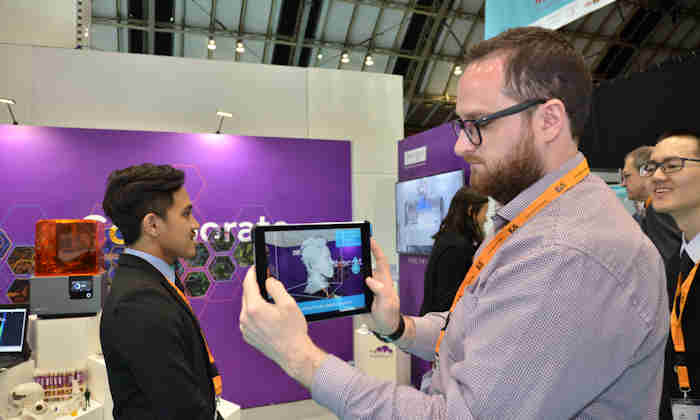Manchester showcases innovation to power next industrial revolution
05 Apr 2017
Our pioneering developments in manufacturing from bone implants to chocolate at Government-backed event

Pioneering developments in manufacturing led by the University – from the biomanufacturing of bone implants to the 3D printing of foodstuff like chocolate – have been showcased at a special Government-backed expo.
The Industry 4.0 Summit, hosted in Manchester this week and backed by Innovate UK, the Government’s innovation agency, was the first of its kind to be held in Europe. It attracted major companies interested in the latest innovation in Industry 4.0, the next transformational phase in industrial development.
Dr Carl Diver, an expert in Industry 4.0 from the University, and colleague Professor Paulo Bartolo, a world-leader in biomanufacturing, shared their expertise at an evidence-gathering session for the Industrial Strategy Commission at the event, which was run by the universities of Manchester and Sheffield.
The University is a recognised leader in research and education associated with Industry 4.0 and joined big name exhibitors to demonstrate its expertise. Our projects and activities included:
- advanced 3D printing technology: the University is pioneering various applications, including the biomanufacturing of bone implants to the 3D printing of food, including chocolate. At the expo a University demonstrator will be able to 3D print miniature versions of volunteer delegates in resin by using sophisticated face scanning technology – and the team has modelled the head of VIP visitor Lord Prior of Brampton, the Parliamentary Under Secretary of State at the Department for Business, Energy and Industrial Strategy (BEIS) who toured the University’s exhibition
- robotics: the University is leading the development of robots to work in harsh environments, such as in the nuclear decommissioning sector. Smart machines developed by the University will be on display, including a dexterous spider-legged robot and another that can slither snake-like through narrow entrances and passages
- smart applications to assist humans: a number of student-led projects are being displayed, including an aid that can help disabled table tennis players pick up a ping-pong ball and serve, as well as low cost prosthetic limb to aid disabled users to play sport or ride a bicycle.
The University also demonstrated creative interactions between people and machines. The Manchester Robot Orchestra, an ambitious citizen science project that encouraged youngsters from across the region to recycle redundant technology to create musical robots, has been on display. The orchestra has recently been hailed in a national report co-published by the Royal Academy of Engineering as an innovative way of inspiring schoolchildren to take up engineering and help fill the skills gap in this critical sector.
Also, the Halléoojamaflipaphone, a project involving University apprentices in partnership with the Hallé orchestra to create a set of bespoke instruments, will perform at the expo.
“Industry 4.0 is about making industry smarter, more flexible, efficient and competitive while also creating new exciting opportunities for people to learn new skills and access training,” explained Dr Carl Diver, from Manchester’s School of Mechanical, Aerospace and Civil Engineering.
He added: “The University of Manchester is playing a key role with research in the areas of manufacturing, advanced materials , robotic systems, cybersecurity, big data, bio-manufacturing, unmanned aerial vehicles, additive manufacturing, chemical engineering, project management, sustainability and smart city solutions through the CityVerve project which highlights the multidisciplinary nature of Industry 4.0.”
Dr Diver said the fact Manchester hosted this summit revealed the city and the wider region was receptive to innovation and developments in world-leading manufacturing. “Manchester is recognised as the birthplace of the first industrial revolution and the UK has maintained its pioneering reputation as we enter another phase of industrial development,” explained Dr Diver.
